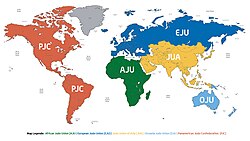
Back Europäische Judo-Union German Ευρωπαϊκή Ένωση Τζούντο Greek Unión Europea de Judo Spanish Euroopan judoliitto Finnish Union européenne de judo French European Judo Union Italian ヨーロッパ柔道連盟 Japanese 유럽 유도 연맹 Korean European Judo Union NB Unioni Evropian i Xhudos Albanian
 | |
 | |
| Abbreviation | EJU |
|---|---|
| Formation | 28 July 1948 |
| Headquarters | Vienna, Austria |
Region served | Europe |
Members | 51 Judo federations |
Official languages | English French Russian |
President | |
Senior Vice-President | |
Vice-Presidents | |
General Secretary | |
Main organ | EJU Congress |
Parent organization | IJF |
| Website | eju |
The European Judo Federation consists of 51 national Judo federations/associations, and is itself recognised by the International Judo Federation as one of five continental unions. The organisation of the administration of Judo is based on a pyramid system of regulations, with the IJF the world governing body, the EJU the European governing body, and national Judo associations the governing bodies at domestic level.[1][2]
The first meeting was held on 26 July 1948, in London to form the European Judo Union (EJU).[citation needed] Representatives from Great Britain, Austria, and the Netherlands took part. The meeting was adjourned until the following Wednesday. On 28 July finally, Great Britain put forward the motion: "That the European Judo Union be now formed on the basis of the Constitution as approved, and that all other European countries be circulated with a copy of it and be invited to join." This was seconded by Holland and approved unanimously.[3] France, who was allowed to express opinions but not to vote.[citation needed]
The object of the proposed Union was the standardisation of judo rules and procedures and the establishment of an international body for arbitration. Inclusion of judo in the Olympic Games was first mentioned in this meeting.[4] Young French publisher Henry D. Plee suggested that he print a translation of the Kodokan's monthly magazine in English and French; the EJU agreed to make it an official organ of the EJU.[citation needed]
After the Russian invasion of Ukraine in February 2022, Russian Sergey Soloveychik resigned as European Judo Union President, a position he had held since 2007, and thereafter the Russian Judo Federation and the Belarusian Judo Federation suspended their participation in all EJU international events, and the EJU cancelled two events that had been scheduled to take place in Russia.[5][6][7] In May 2023, following the IJF's decision to reinstate Russia and Belarus, the EJU followed suit and re-admitted Russian and Belarusian athletes.[8]
- ^ Guttmann, Allen (6 September 2017). Japanese Sports: A History. University of Hawaii Press. ISBN 9780824824648. Retrieved 6 September 2017 – via Google Books.
- ^ Blanpain, Roger (6 September 2017). European Labour Law. Kluwer Law International. ISBN 9789041127679. Retrieved 6 September 2017 – via Google Books.
- ^ Judo Unionbudokwai.net Archived 21 September 2018 at the Wayback Machine
- ^ Green, Thomas A.; Svinth, Joseph R. (6 September 2017). Martial Arts in the Modern World. Greenwood Publishing Group. ISBN 9780275981532. Retrieved 6 September 2017 – via Google Books.
- ^ "European Judo Union cancels two 2022 events in Russia".
- ^ "Russia withdraw from international judo events over safety fears". www.insidethegames.biz. 14 March 2022.
- ^ "Soloveychik resigns as EJU President following Russian invasion of Ukraine". www.insidethegames.biz. 28 February 2022.
- ^ Чистова, Елена (13 May 2023). "Российские дзюдоисты смогут участвовать на турнирах в Европе в нейтральном статусе". Чемпионат (in Russian). Retrieved 26 June 2023.